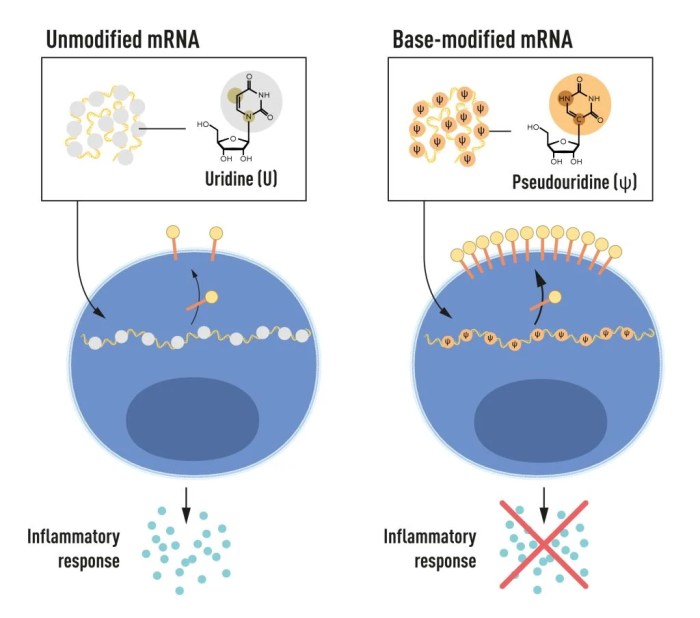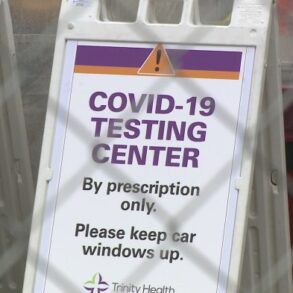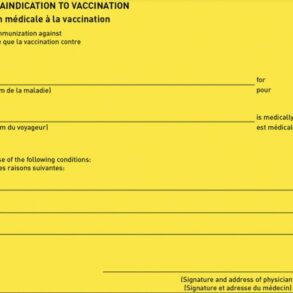Nobel prize physiology medicine covid vaccines katalin kariko drew weissman – Nobel Prize physiology medicine COVID vaccines Katalin Karikó and Drew Weissman mark a monumental achievement in modern medicine. Their groundbreaking work with mRNA paved the way for rapid vaccine development during the COVID-19 pandemic, revolutionizing how we approach disease prevention.
This exploration delves into the pivotal contributions of Karikó and Weissman, detailing their scientific breakthroughs and the impact of their mRNA vaccines on the COVID-19 pandemic. It examines the scientific rationale, ethical considerations, and future potential of mRNA technology, providing a comprehensive overview of this transformative advancement in medicine.
Katalin Karikó and Drew Weissman’s Contributions
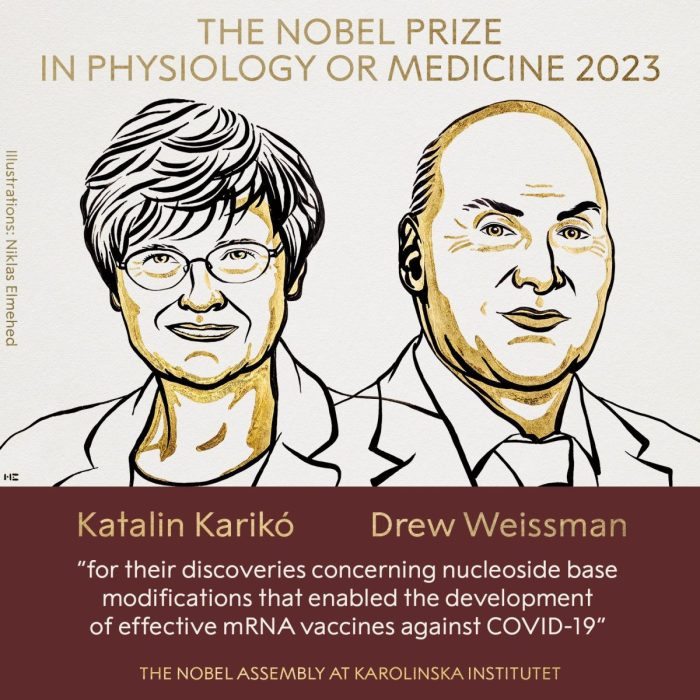
The 2023 Nobel Prize in Physiology or Medicine honored Katalin Karikó and Drew Weissman for their groundbreaking work on mRNA technology, paving the way for the rapid development of COVID-19 vaccines. Their decades-long research into mRNA’s potential as a therapeutic tool revolutionized vaccine design and holds immense promise for future medical advancements. This exploration delves into their individual contributions, their pivotal discoveries, and the profound impact on the field of medicine.
Biographies of Katalin Karikó and Drew Weissman
Katalin Karikó, a Hungarian-American biochemist, dedicated her career to unraveling the intricacies of mRNA. Prior to her Nobel Prize-winning work, Karikó’s research focused on understanding how cells process and translate mRNA, with a particular emphasis on the modifications that occur to RNA molecules. She meticulously studied the critical role of RNA modifications in cellular function, and this work laid the foundation for her later breakthroughs in mRNA technology.
Drew Weissman, an American immunologist, has a long history of research into the immune system, particularly its response to vaccines. Weissman’s extensive work involved studying how the immune system recognized and responded to various antigens, including those present in viral infections. His expertise in immunology proved invaluable in translating Karikó’s findings into practical applications.
Scientific Breakthroughs with mRNA
Karikó and Weissman’s groundbreaking work centered on modifying mRNA molecules to enhance their stability and safety within human cells. Traditional mRNA, prone to rapid degradation and triggering harmful immune responses, posed significant challenges for therapeutic applications. Their innovative approach involved modifying the chemical structure of mRNA, specifically the uridine base, to render it less susceptible to degradation and immune system recognition.
This crucial modification allowed mRNA to persist longer within cells, enabling effective protein synthesis without triggering unwanted immune reactions.
Roles in Developing mRNA COVID-19 Vaccines
Karikó’s expertise in mRNA modification was instrumental in ensuring the safety and efficacy of the mRNA vaccines. Her modifications minimized the immune response to the mRNA itself, thereby allowing the body to focus on generating an immune response against the viral proteins encoded by the mRNA. Weissman’s expertise in immunology was essential in understanding how the modified mRNA triggered the desired immune response, leading to the development of vaccines capable of generating neutralizing antibodies and cellular immunity.
Their collaborative effort was pivotal in translating scientific knowledge into practical solutions.
Impact on Medicine and Biotechnology, Nobel prize physiology medicine covid vaccines katalin kariko drew weissman
The impact of Karikó and Weissman’s work extends far beyond the COVID-19 pandemic. Their discoveries have opened doors to a new era of mRNA therapeutics, offering potential treatments for a wide range of diseases. The technology holds promise for developing personalized vaccines and therapies tailored to individual genetic predispositions and disease characteristics. The rapid development of COVID-19 vaccines demonstrated the potential of mRNA technology to address global health crises with unprecedented speed.
Comparison with Other Prominent Figures in mRNA Research
| Researcher | Key Contributions |
|---|---|
| Katalin Karikó | Identified and developed modified mRNA sequences for stability and reduced immune activation. |
| Drew Weissman | Provided expertise in immunology to understand how modified mRNA triggered immune responses and developed strategies for effective vaccine design. |
| Robert Malone | Played a role in the development of mRNA technology, but his approach and views differ from Karikó and Weissman. |
| Other researchers in mRNA synthesis | Contributed to the fundamental understanding of mRNA processing and delivery mechanisms. |
mRNA COVID-19 Vaccine Development
The development of mRNA vaccines, particularly for the COVID-19 pandemic, marked a remarkable scientific achievement. These vaccines leveraged a novel approach to immunology, utilizing messenger RNA (mRNA) to instruct cells to produce viral proteins. This approach drastically accelerated vaccine development timelines compared to traditional methods.The mRNA vaccine technology, while not entirely new, saw a rapid evolution during the pandemic.
This allowed for a rapid response to the emerging global health crisis, offering a potent tool for preventing severe disease and transmission. Scientists and researchers quickly adapted existing knowledge to produce highly effective vaccines in record time.
Mechanism of Action of mRNA Vaccines
mRNA vaccines work by introducing a specific mRNA sequence into the body. This mRNA sequence codes for a viral protein, such as the spike protein of the SARS-CoV-2 virus. Once inside cells, the mRNA is translated into the viral protein. The presence of this protein triggers an immune response, leading to the production of antibodies and T cells that recognize and target the virus.
This immune response effectively prepares the body to fight off a future infection. The body’s immune system learns to recognize and destroy the specific pathogen, creating immunological memory.
Comparison of Different mRNA COVID-19 Vaccines
Different mRNA COVID-19 vaccines utilized slightly varying formulations and approaches. These variations primarily involved the mRNA sequence itself, the lipid nanoparticle delivery system, and the production process. Some vaccines used a different mRNA sequence that encoded for the SARS-CoV-2 spike protein, while others utilized slightly modified lipid nanoparticles. These differences in formulation contributed to slight variations in efficacy and safety profiles, though the overall effectiveness remained remarkably consistent.
Key Steps in mRNA Vaccine Development and Testing
The development of mRNA vaccines involved rigorous scientific testing. The process typically began with the identification of the target antigen (the viral protein). This was followed by designing the mRNA sequence, which is then synthesized and tested for its stability and efficiency. The mRNA is then encapsulated in lipid nanoparticles for delivery into cells. The next step is preclinical testing in animals to assess safety and efficacy.
Following successful animal trials, human clinical trials proceed in phases to assess safety, dosage, and efficacy in humans. Data collected during clinical trials is meticulously analyzed and used to refine the vaccine formulation and production process.
Timeline of Key Events in mRNA COVID-19 Vaccine Development
| Date | Milestone |
|---|---|
| Early 2020 | Initial identification of SARS-CoV-2 and spike protein target |
| Spring 2020 | Rapid mRNA sequence design and synthesis |
| Summer 2020 | Initial preclinical testing in animals |
| Fall 2020 | Initiation of Phase 1 clinical trials in humans |
| Late 2020 | Positive Phase 1 and 2 results |
| Early 2021 | Large-scale Phase 3 clinical trials |
| December 2020 – January 2021 | Emergency Use Authorization (EUA) applications for some vaccines |
| 2021 | Widespread vaccine rollout and ongoing monitoring of safety and efficacy |
Safety and Efficacy Data for mRNA Vaccines
Extensive data from clinical trials demonstrated the safety and efficacy of mRNA vaccines against COVID-19. The vaccines were remarkably effective at preventing severe illness, hospitalization, and death. The side effects were generally mild and transient, typically including injection site pain, fatigue, and fever. Long-term safety data is still being collected and analyzed, but initial results are promising.
| Vaccine | Efficacy (%) | Safety Profile |
|---|---|---|
| Moderna | >90% | Generally well-tolerated, mild side effects |
| Pfizer-BioNTech | >90% | Generally well-tolerated, mild side effects |
| Other | Variable, but high efficacy in most cases | Generally well-tolerated, mild side effects |
Impact of Vaccines on the COVID-19 Pandemic
The development and deployment of mRNA COVID-19 vaccines marked a pivotal moment in the fight against the pandemic. These vaccines, unlike traditional approaches, utilized a novel technology that allowed for rapid production and adaptation to evolving viral variants. Their global impact was profound, significantly altering the course of the pandemic and saving countless lives.The rapid development and deployment of mRNA vaccines, facilitated by scientific breakthroughs and global collaboration, dramatically altered the trajectory of the COVID-19 pandemic.
Their effectiveness in mitigating the spread of the virus and reducing severe illness was instrumental in bringing the pandemic under control, allowing economies to reopen and communities to resume normal activities.
The Nobel Prize in Physiology or Medicine for COVID-19 vaccines, recognizing Katalin Karikó and Drew Weissman’s groundbreaking work, is truly inspiring. While we’re all eagerly awaiting tonight’s Apple event, hopefully, some of the innovative advancements we’ll see in new technology will help us further develop and improve vaccines for future health crises, similar to the crucial role these scientists played in the fight against COVID.
Check out this article to get a preview of what Apple might unveil. Their dedication to pushing the boundaries of medical science, like the work of Karikó and Weissman, truly inspires future innovation.
Global Impact of mRNA Vaccines
mRNA vaccines played a crucial role in curbing the spread of COVID-19 worldwide. Their accessibility and relatively rapid rollout contributed to a substantial decrease in infection rates, hospitalizations, and deaths in many countries. This impact was particularly evident in areas with high vaccination rates.
Effectiveness in Reducing Transmission and Severe Illness
Extensive data from various clinical trials and real-world studies consistently demonstrated the efficacy of mRNA vaccines in reducing transmission and severe illness associated with COVID-19. Vaccination significantly lowered the risk of hospitalization and death, particularly among vulnerable populations. For instance, studies showed a substantial reduction in the risk of severe illness and death in elderly individuals and those with pre-existing conditions.
Factors Influencing Vaccine Hesitancy and Acceptance
Several factors influenced the acceptance and hesitancy surrounding mRNA vaccines. Concerns about the safety and efficacy of a novel technology, misinformation circulating online, and political or social divisions played a significant role in shaping public opinions. In some regions, the availability and accessibility of vaccination programs, coupled with public health campaigns emphasizing the importance of vaccination, significantly boosted acceptance.
The Nobel Prize in Physiology or Medicine for COVID-19 vaccines, awarded to Katalin Karikó and Drew Weissman, highlights groundbreaking mRNA research. Meanwhile, fascinating details about the upcoming Google TV streamer are emerging, including leaked design features that suggest a sleek and improved user experience, as detailed in this article: google tv streamer leak design features. This innovation in mRNA technology, which paved the way for these crucial vaccines, continues to be a critical area of research.
Long-Term Effects of mRNA COVID-19 Vaccines
Long-term effects of mRNA COVID-19 vaccines are still under investigation. While initial data suggests a favorable safety profile, ongoing monitoring and research are essential to fully understand the long-term implications of these vaccines. The development of potential long-term effects is a continuing area of research and is critical for public health strategies.
Efficacy and Safety Compared to Other COVID-19 Vaccines
mRNA vaccines, while novel, demonstrated high efficacy and safety compared to other types of COVID-19 vaccines. Their ability to rapidly adapt to new variants was a significant advantage. The efficacy and safety profiles of different types of vaccines, including traditional inactivated vaccines and adenoviral vector vaccines, were subject to extensive analysis and comparison, providing valuable insights into their relative merits.
Ultimately, the choice of vaccine often depended on factors such as availability, logistical considerations, and specific needs of different populations.
Scientific and Ethical Considerations
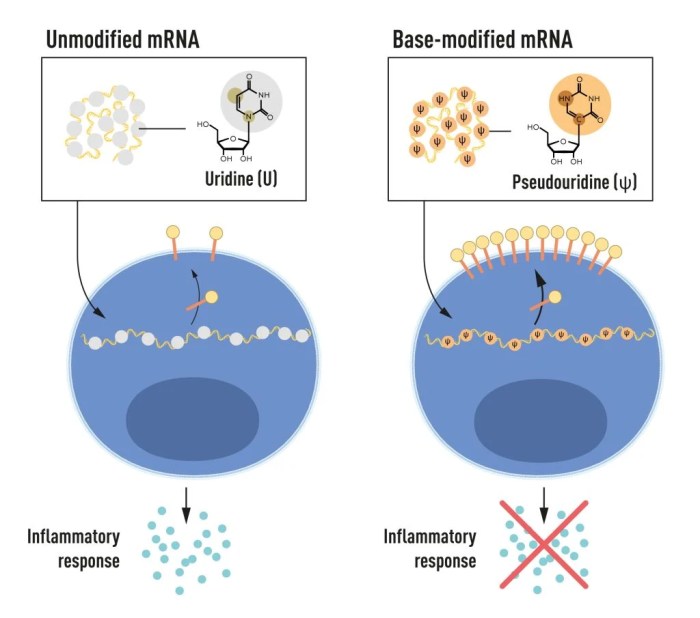
The rapid development and deployment of mRNA COVID-19 vaccines presented a unique confluence of scientific innovation and ethical dilemmas. The unprecedented speed of this process, while crucial in combating a global pandemic, necessitated careful consideration of potential long-term effects and societal implications. This exploration delves into the scientific underpinnings of mRNA vaccines, the ethical considerations surrounding their deployment, and the potential long-term impact on human health, alongside a comparative analysis with other vaccination approaches.
Scientific Rationale Behind mRNA Vaccine Use
mRNA vaccines leverage the body’s natural cellular machinery to produce protective antigens. Instead of introducing weakened or inactive pathogens, mRNA vaccines provide the genetic code for producing specific viral proteins. These proteins, recognized as foreign by the immune system, trigger an adaptive immune response, leading to the production of antibodies and T cells that can neutralize the virus.
This approach is particularly advantageous for rapidly adapting pathogens like coronaviruses, as the genetic code can be easily modified to match evolving viral strains. The mRNA molecules themselves are short-lived and quickly degraded within cells, minimizing potential long-term effects. Furthermore, the use of mRNA avoids the risks associated with live attenuated or inactivated virus vaccines, such as potential for reversion to virulence.
The Nobel Prize in Physiology or Medicine for COVID-19 vaccines, awarded to Katalin Karikó and Drew Weissman, highlights crucial advancements in mRNA technology. This groundbreaking work paved the way for rapid vaccine development. Interestingly, this technological leap also intersects with the future of education, as Google preps a Chromebook app mall google preps chromebook app mall to provide more diverse learning resources.
Ultimately, the ingenuity behind the Nobel Prize-winning mRNA research continues to shape both healthcare and education in innovative ways.
Ethical Considerations Surrounding Rapid Development and Deployment
The accelerated timeline for mRNA vaccine development raised several ethical concerns. One crucial consideration was the rigorous and transparent testing protocols. While the clinical trials were conducted expeditiously, they adhered to established ethical guidelines regarding participant safety and data integrity. Another aspect was the equitable distribution of vaccines globally. Ensuring access to these life-saving treatments for all populations, regardless of socioeconomic status, was a major ethical imperative.
The potential for vaccine hesitancy and misinformation also posed a significant challenge to public health efforts. Open communication and education campaigns were critical to fostering trust and promoting vaccination uptake.
Potential Long-Term Effects of mRNA Vaccines
The long-term effects of mRNA vaccines are still under investigation. Initial data suggests a favorable safety profile, with adverse events primarily localized and transient. However, the long-term impact on human health is an ongoing area of research. The unique characteristics of mRNA vaccines, including their transient nature and potential for adaptation to new strains, warrant continued monitoring.
Studies are underway to assess potential long-term impacts on the immune system, the possibility of autoimmune reactions, and any interactions with other medical conditions.
Comparison of mRNA Vaccines with Other Vaccination Approaches
mRNA vaccines represent a paradigm shift in vaccine technology, offering advantages in speed and adaptability. Compared to traditional methods like inactivated or live-attenuated vaccines, mRNA vaccines have faster development cycles and can be tailored more readily to emerging viral threats. However, concerns about long-term safety remain a focus of ongoing research. Other vaccine approaches have their own advantages and disadvantages, and each has contributed to the overall effort in preventing disease.
Ethical Concerns and Perspectives Related to mRNA Vaccine Development
| Ethical Concern | Perspective 1 (Pro-Vaccine) | Perspective 2 (Cautious/Skeptical) |
|---|---|---|
| Speed of Development | Rapid development was crucial for addressing a global health crisis, saving lives and preventing severe illness. | Accelerated timelines may have compromised rigorous safety testing and long-term monitoring. |
| Equity of Access | Global efforts to ensure equitable distribution of vaccines are crucial for pandemic control. | Unequal access to vaccines could exacerbate health disparities and lead to new outbreaks. |
| Potential Long-Term Effects | Ongoing monitoring and research are essential to fully understand the long-term impacts. | Uncertainty surrounding potential long-term effects requires careful consideration and vigilance. |
| Vaccine Hesitancy and Misinformation | Public health campaigns and education are vital to combat misinformation and build trust. | Misinformation campaigns can undermine public confidence in vaccines and hinder vaccination efforts. |
Future Directions in mRNA Technology
mRNA technology, catapulted into the spotlight by its pivotal role in COVID-19 vaccine development, now promises a broader impact on healthcare. Beyond vaccines, mRNA holds immense potential for treating a wide range of diseases, leveraging its unique ability to deliver genetic instructions directly to cells. This innovative approach offers unprecedented possibilities for personalized medicine and targeted therapies.The ongoing research and development in mRNA-based therapies are driven by the desire to improve efficacy, reduce side effects, and expand the spectrum of treatable diseases.
Early successes and ongoing trials are laying the foundation for a future where mRNA therapies become a cornerstone of modern medicine.
Potential Applications Beyond Vaccines
mRNA technology isn’t limited to immunizations. Its ability to precisely deliver genetic material makes it a compelling candidate for various therapeutic applications. The versatility of mRNA allows for the creation of customized treatments tailored to specific diseases and patient needs. This personalized approach could revolutionize cancer therapies, for instance, by targeting tumor-specific cells without harming healthy tissues.
Ongoing Research and Development in mRNA-Based Therapies
Extensive research is underway to refine mRNA technology and expand its therapeutic applications. Scientists are working to improve mRNA stability, reduce immune responses, and enhance delivery mechanisms. These advancements will pave the way for more effective and safer mRNA therapies. Examples include developing mRNA-based treatments for genetic disorders, like cystic fibrosis, and exploring their potential in regenerative medicine.
Initial studies show promise in treating hemophilia, a blood clotting disorder, and various cancers.
Promising Areas for Future Applications
mRNA technology’s potential extends to several areas. One promising area is cancer treatment, where mRNA can be designed to target specific cancer cells, delivering therapies that enhance the body’s immune response or directly inhibit tumor growth. Another area is infectious diseases, where mRNA could be used to develop treatments and preventative measures for emerging pathogens, as demonstrated by the COVID-19 vaccine development.
Challenges and Opportunities in Scaling Up mRNA Vaccine Production
While mRNA technology offers remarkable possibilities, challenges remain in scaling up production to meet global demand. Optimizing manufacturing processes and reducing costs are critical to ensuring widespread access to mRNA therapies. This includes leveraging automation and identifying cost-effective production strategies. Current advancements in automated mRNA synthesis and improved manufacturing facilities are addressing these issues. The COVID-19 vaccine rollout demonstrated the capability of rapid mRNA production, which sets a precedent for future needs.
Table of Potential Future Applications
| Disease Area | Potential mRNA Application |
|---|---|
| Cancer | Targeted cancer therapies, immune checkpoint blockade, oncolytic viruses |
| Infectious Diseases | Treatments and preventative measures for emerging pathogens, influenza, HIV |
| Genetic Disorders | Cystic fibrosis, hemophilia, muscular dystrophy |
| Autoimmune Diseases | Targeting specific immune cells, reducing inflammation |
| Cardiovascular Diseases | Gene therapy for heart regeneration, repair of damaged tissues |
| Neurological Diseases | Delivering therapeutic proteins to neurons, treating Alzheimer’s and Parkinson’s |
Closure: Nobel Prize Physiology Medicine Covid Vaccines Katalin Kariko Drew Weissman
The Nobel Prize for Karikó and Weissman stands as a testament to the power of scientific collaboration and innovation. Their mRNA vaccine technology has profoundly impacted global health, offering a potential solution for future pandemics and diseases. The future of mRNA technology looks promising, with ongoing research pushing the boundaries of what’s possible. The journey to develop and deploy these vaccines was remarkable, highlighting the resilience and dedication of scientists and researchers worldwide.



